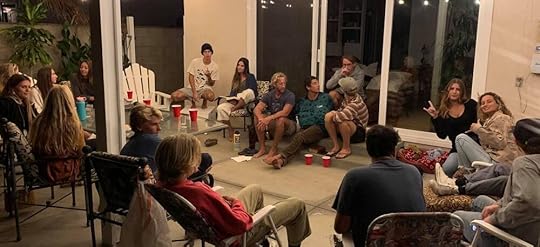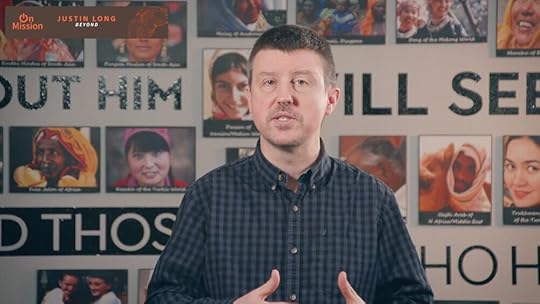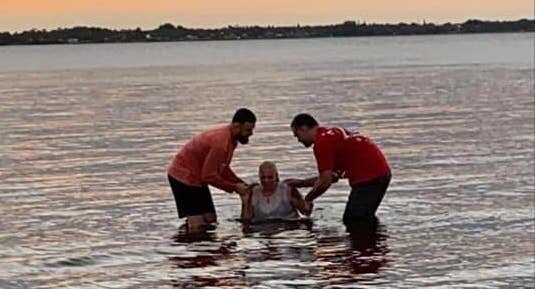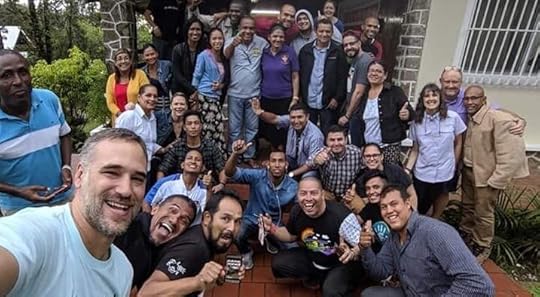Steve Addison's Blog, page 32
December 21, 2020
Why did Jesus come?

Adoration of the Sheperds - Matthias Stomer circa 1650
Christmas is a time to marvel at the news that God has come in the form of a baby, born in a manger.
He has come into a world broken by our rebellion, on a mission. What is that mission?
Recently the emphasis has been on God’s mission to renew the whole creation. Salvation isn’t just getting people to heaven, salvation means political and economic justice, creation care, racial and gender equality.
It’s true, one day heaven and earth will be united, salvation is for the whole created order. We will not spend eternity as disembodied spirits. The world was created good. Jesus rose from the dead in bodily form as the first fruits of a world transformed.
Paul tells us the creation is groaning in labor pains awaiting redemption (Romans 8:28). Creation groans because humanity has turned its back on God and brought harm to the created order. The damage we’ve done is not Paul’s focus here. Creation has been subject to futility by God. A broken world is God’s judgment on human sin. Suffering, even innocent suffering, is the fruit of going our own way. It’s God’s megaphone to rouse a deaf world (CS Lewis).
So when the angel of the Lord comes to Joseph he announced that Mary will give birth to a son and he is to be named Jesus, because he will save his people from their sins (Matthew 1:21). This is the heart of why Jesus came, and the meaning of Christmas.
Jesus came to save us from our sins. Embarrassing isn’t it? Not a message the world wants to hear. Much easier to talk in vague terms about changing the world rather than forgiveness of sins.
Jesus went about doing good and healing all who were under the power of the devil. He gave bread to the hungry, he healed sick bodies, he set the captives free. He announced the coming of God’s kingdom rule. But when they wanted the bread, but not the Bread of Life; when they wanted the healing but not the Healer; when they wanted the kingdom but not the King — he pronounced judgment and walked away (Matthew 11:23; John 6).
Jesus called everyone — the poor, the powerful, the rich, the outcast — to repent and put their faith in him. No communities were transformed, except into riots. No empires were overthrown. He promised his messengers trouble, not worldly power and success. But wherever the Word went the fruit was always disciples learning to follow and obey Jesus in communities. From Jerusalem to the ends of the earth. That’s why Jesus came.
God will renew the world, on the other side of his judgment. A broken world is an opportunity to demonstrate love to those in need, and a reminder that this world is not our home and that we have a job to do.
When Jesus rose from the dead he opened the minds of his failed disciples to understand the breadth of God’s mission in the Scriptures. He told them,
This is what is written: The Messiah will suffer and rise from the dead on the third day, and repentance for the forgiveness of sins will be preached in his name to all nations, beginning at Jerusalem. You are witnesses of these things. I am going to send you what my Father has promised; but stay in the city until you have been clothed with power from on high. (Luke 24:45-49)
That’s why Jesus came. That’s the meaning of Christmas.
December 14, 2020
The Triumph of the Sexual Revolution
The sexual revolution began in the 60s and hasn’t stopped. The long march through the institutions will continue. Two good responses…
The video is put out by evangelical Anglicans in the UK.
The book is The Rise and Triumph of the Modern Self by Carl Trueman. Here’s a review article.
December 8, 2020
237-LA Stories

There are multiplying streams of disciples and churches breaking out in Los Angeles. I talk to JT Timblin, Rick Preato and Troy Cooper.
Troy Cooper mentions the Acts 2 Church Circle tool.
For US based training visit NoPlaceLeft.
237-LA Breakthroughs

There are multiplying streams of disciples and churches breaking out in Los Angeles. I talk to JT Timblin, Rick Preato and Troy Cooper.
Troy Cooper mentions the Acts 2 Church Circle tool.
For US based training visit NoPlaceLeft.
December 3, 2020
1,369 Movements to Christ — and counting

Justin Long
Only God starts movements but we have to be there because he uses us.
Justin Long
Ten years ago Justin Long thought there might be around 100 multiplying movements of disciples and churches around the world.
By 2017 he'd documented 600 movements—beyond all expectations.
A movement consistently sees four generations of disciples gathered in churches, in multiple streams. Usually that’s at least 1,000 disciples, but the important measure is four generations of disciples and churches. Once a movement reaches four generations, it rarely ends.
Today, Justin is tracking 1,369 movements around the world. That’s over 1% of the world’s population. At least 77 million disciples in 4.8 million churches.
In addition to existing movements, there are 4,500 “engagements” around the world. An engagement is a team or teams focused on starting a movement among a specific people group, cluster, or language.
Movements are found predominantly in Asia and Africa where the world’s population is growing the fastest. The largest number of disciples are among former Muslims and Hindus.
There are documented movements in Europe, Latin America, North America, and the Pacific.
Movements are strongest in rural areas but are moving into the cities.
The number of movements is growing incrementally, not yet exponentially. The number of churches is growing exponentially.
December 1, 2020
Jesus, the Great Commission, and the Kingdom of God

Gordon Fee points out, the central theme of Jesus’ mission and message was “the good news of the kingdom of God,” to miss this term is to miss Jesus altogether. So what’s the relationship between the kingdom of God and the Great Commission in Matthew 28?
The kingdom of God is a time when God will establish his rule over all things. God chose Abraham in response to the cycle of sin and judgment in human history and made a covenant with him that through his seed, all the peoples of the world will be blessed. He promised David would rule over Israel and extend God’s rule to the world. When Israel repeatedly broke the covenant and failed in her calling to be a witness to the world, the prophets looked forward to a future day of salvation for a repentant and righteous remnant and judgment upon his enemies within Israel and among the nations. The whole creation would know his redemption, evil and oppression will be overturned, justice and righteousness would triumph and the nations would be drawn to Jerusalem and learn to walk in his ways.
Israel’s return from exile never lived up to these expectations and longing and hope grew that one day God would break into history and establish his rule in the hearts of his people through the pouring out of the Holy Spirit and the glory of God would fill the earth.
After 400 years of prophetic silence, John the Baptist came proclaiming, “Repent for the kingdom of God is near.” God is breaking into history to establish his rule. When Jesus came after John his message was the same, the kingdom of God is at hand. At his home synagogue in Nazareth he preached from Isaiah 61 about God’s “anointed” (Messiah) who would proclaim good news to the poor and the year of the Lord’s favour (Luke 4:16-30). These prophecies are being fulfilled in his ministry. The kingdom has come and God’s mercy is revealed as he heals the sick, casts out demons and welcomes sinners.
Jesus spoke of the kingdom as both present and future. The kingdom was in their midst and could be seen in Jesus’ message and ministry. Jesus came to destroy the works of the enemy and set free the oppressed. This meant good news to the poor, freedom for prisoners, sight for the blind. Yet the kingdom had not come in its fullness, it remained hidden to those who would not see and incompressible to those who would not hear. The kingdom had not come as a political and military force to throw off the oppression and injustice of the Roman conquerors. The kingdom came as an insignificant mustard seed. The kingdom was present in the weakness and suffering of the Son of Man who came to serve, to seek and save the lost, to give his life as a ransom for many. The coming of the kingdom requires repentance and faith in the one who brings it.
The “poor” include widows and orphans, the helpless and defenseless who must rely on God and others to survive. As Jesus’ ministry demonstrates, the poor also include “sinners who know their poverty of spirit (Matt 5:3) and stand helpless before God in need of his mercy” (Fee). They are the prodigal who returns to his father’s house, the woman who kneels at Jesus’ feet and weeps, the tax-collector who cries out to God in the temple for mercy, a fisherman who knows he his a sinner, even a rich young man who walks away. Jesus has come to free all those captive to Satan’s tyranny.
The gospel is good news to the poor because God loves to feed the hungry and he wants his disciples to share the same concern. The gospel is good news to the sick because Jesus is moved with compassion in the face of human need, he heals the sick and sends his disciples out to do the same. The gospel is the good news of freedom to the oppressed because Jesus came to destroy the works of the Enemy and his disciples have the same authority.
Yet the gospel is more than bread for the hungry for Jesus is the Bread of Life. The gospel is more than healing for sick bodies because Jesus is the resurrection and the life. These are the signs of the kingdom, not the kingdom themselves. They point to the King who calls them to repent and believe in order to come under God’s loving rule.
Some people think the coming of the kingdom is all about the transformation of society, others that it’s signs and wonders. Yet Jesus denounced the towns in which most of his miracles were performed as worse than Sodom and facing God’s judgment. Why? They refused to repent (Matt 11:20-24). You can’t enter the kingdom without becoming a disciple of the King.
They must all repent, become like a children and totally depend on the Father’s goodness. They must lose their lives and find them again in Jesus. They must die to live. They must let go of greed and trust the Father to care and to provide. Forgiven, they must forgive. Loved, they must love.
He calls them to follow him and promises to teach them to fish for people—to rescue others as he has rescued them. Satan’s rule is broken in every form—sin, sickness, oppression, and injustice. Jesus has won the victory through his life and ministry, death and resurrection.
This is the gospel of the kingdom that must be preached throughout the world to every people group before the end comes when the kingdom will be established in its full glory and power.
We live between the times, the overlap of the ages, between the coming of the kingdom through Jesus and the fullness of God’s rule at the end of history. When Jesus returned to the Father in Acts 1 the disciples were left staring up into the sky wondering when he would return. They had to be reminded that while we wait for Christ’s return there is a job to be done, making disciples of the nations by going, baptising and teaching them to obey what Jesus has commanded.
Jesus gave the Great Commission, in its various forms in the Gospels and Acts, as the core missionary task before the coming of his kingdom in fullness at the end of the age. There’s nothing more important.
Series:
The Great Commission in the Gospels and Acts
The Great Commission in Acts
The Great Commission in Matthew
The Great Commission in John
The Great Commission in Luke
November 27, 2020
Black Friday Special
November 26, 2020
236-You Will Receive Power

Craig Keener is a New Testament scholar who has a heart for world missions. He joins me to talk about the link between the coming of the Holy Spirit and the launch of a missionary movement in Acts 2.
Craig has written more books and articles than I’ve had cooked breakfasts.
November 20, 2020
I’ve seen the future, it’s Venezuelan, Nigerian, Brazilian, Afghani, ...

Oggie Martin (front left)
I was on a call to my Argentinian friend Oggie Martin a few days ago. He’s an apostle to the Latino world of 600 million people. Wherever he goes, the gospel gets out, and the fruit is growing disciples, reproducing churches, and more workers.
Oggie’s come up with a plan to reach Spain via Venezuela. Venezuela is on the brink of collapse. There are few jobs and not much in the way of government support. To survive in Venezuela you need to start a business. Oggie has Venezuelans he’s trained to make disciples and plant churches, they don’t have any money. So one of them set up a bakery and supports himself by baking bread. He doesn’t have a lot of spare time so his whole life is ministry. Whatever he’s doing, wherever he is, he’s connecting, sharing, making disciples, and planting churches. It’s going well, even better than some workers who have full-time support.
Oggie has that apostolic gift, so he sees the big picture. He thinks, what if we could teach others to support themselves by baking bread? Imagine the impact on Venezuela. Then he found out that because of the crisis, Spain has prioritized Venezuelan immigration. If a Venezuelan can get to Spain, the government will welcome them and provide housing and support to help them get on their feet. Oggie wonders, why not send Venezuelan missionaries to Spain?
Oggie is still thinking about it, but that’s how he thinks.
This is what we miss in the prosperous West—the simplicity of the core missionary task, and the reality that we are no longer the center of the Christian world. There are impoverished Venezuelans ready and willing to bring the gospel back to Europe. The same is true of the Nigerians, Brazilians and I almost forgot—the Afghans, Arabs, Iranians, and Pakistanis. Refugees are fleeing war zones and finding Christ in Greece. They’re learning to follow Jesus, share the gospel, make disciples, and plant churches. I’ve met them. It’s happening. Some end up throughout Europe. Imagine that, Muslim background believers making disciples in Europe. Others choose to return home and take the gospel with them.
The missionary mandate Jesus gave is clear, concrete, and simple—I didn’t say easy. A Venezuelan in Spain, a Nigerian in London knows what to do. They make contact with people far from God. They share the gospel, they baptise and teach new disciples how to obey Christ in community. They train workers. They know that Christ goes with them as they go to the ends of the earth.
In the West, we’re in a missional fog. We think we’re going to renew creation, restructure the economy, smash the patriarchy, transform the city, and promote universal human flourishing. Or at least campaign for those things on Facebook and Twitter. That’s mission from the perspective of privilege and power. You can’t do those things unless you’re a Westerner or part of an elite in a poor nation. We’ve drifted from the center—salvation through Christ that leads to discipleship in community.
Oggie’s Venezuelans have the passion to obey Christ’s command to make disciples. They are the future. Let’s go with them.
November 16, 2020
Living With The Rise and Fall of Movements
A chat with Cindy Anderson applying the principles of The Rise and Fall of Movements.





